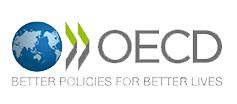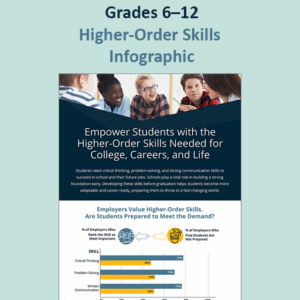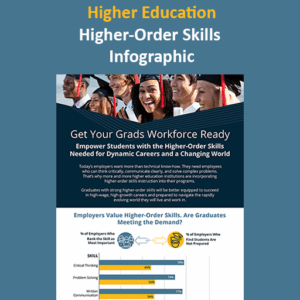The study highlights research findings that explored whether global higher education graduates are gaining essential skills, such as critical thinking
| Source: GlobeNewswire
The Council for Aid to Education, Inc. (CAE), a nonprofit developer of assessments that measure students’ academic and career readiness, and the Organization for Economic Co-operation and Development (OECD), an intergovernmental body comprising 38 member countries that works to stimulate economic progress and world trade, today announced the release of a new global report co-edited by Dirk Van Damme, former head of the Centre for Educational Research and Innovation at OECD and current senior research fellow at the Centre for Curriculum Redesign and Doris Zahner, Ph.D., CAE chief academic officer.
For this study, CAE’s performance-based Collegiate Learning Assessment (CLA+) was used to assess proficiency of over 120,000 participants across seven countries (U.S., United Kingdom, Italy, Mexico, Finland, Chile, and Australia) between 2016 and 2021. The assessment was translated into the native language in each country. In addition to the combined data set, individual participating countries each contributed a chapter in the report.
The main finding from the study, presented at a webinar on August 30, shows an increase in critical thinking and written communication skills of higher education students in the global sample. However, upon graduation, only 53% are proficient in these skills. The report also presents evidence that it is feasible to measure these skills using a valid and reliable performance-based assessment in an international context.
“Across all samples, proficiency is lower and learning gain in critical thinking is smaller than we expect from higher ed, and differences between country samples are huge, suggesting some systems do much better than others in fostering critical thinking,” said report co-editor Dirk Van Damme. “If universities really want to foster 21st-century skills such as critical thinking, they need to upscale their efforts.”
In addition to the co-editors, co-authors of the report included: Olivia Cortellini, Tess Dawber, and Kelly Rotholz from CAE; Jessalynn James and Jon Lehrfeld from the United States; Alberto Ciolfi and Morena Sabella from Italy; Jani Ursin, Heidi Hyytinen, and Katri Kleemola from Finland; J.G. Morris and S.C. Brand from the UK; Patricia Rosas, Carlos I. Moreno, Rubén Sánchez from Mexico; J. Enrique Froemel from Chile; and Mark Keough from Australia.
“The results outlined in this report show the power of assessing critical thinking skills and how such assessments can feed into the higher education policy agenda at the national and international level,” said report co-editor Doris Zahner, Ph.D., CAE chief academic officer. “Given that proficiency in these essential skills is predictive of positive academic and post-university outcomes, higher education institutions should explicitly teach and measure these skills.”
The Aug. 30 presentation and panel discussion on the study’s main findings are now available for free on-demand viewing. Hosted by the ZEIT-Stiftung Ebelin und Gerd Bucerius in Hamburg, Germany, and moderated by Stephen Flynn, communication coordinator OECD/EDU, almost 500 participants representing 75 countries attended the live-stream of the presentation.
Additional panelists included: Meinhard Weizmann, CEO, Bucerius Law School; Tatiana Matthiesen, head of education and training, ZEIT-Stiftung Ebelin und Gerd Bucerius; Bob Yayac, CEO & president, CAE; Andreas Schleicher, director for education and skills, OECD; Barbara Ischinger, former director for education and skills, OECD; and Judith Eaton, former president of the Council for Higher Education Accreditation and CAE board member.
The publication is available to read online for free or to purchase at: https://www.oecd-ilibrary.org/content/publication/cc9fa6aa-en.
About CAE
A nonprofit organization whose mission is to improve student outcomes, CAE develops performance-based and custom assessments that authentically measure students’ essential college and career readiness skills and identify opportunities for student growth. CAE’s Collegiate Learning Assessment (CLA+) and Success Skills Assessment (SSA+) for higher education, and College and Career Readiness Assessment (CCRA+) for secondary education, evaluate the skills educational institutions and employers demand most: critical thinking, problem solving and effective written communication. Based on CAE’s research, these skills are predictive of positive college and career outcomes. CAE also partners with its clients to design innovative performance assessments that measure the constructs vital to students, educators, and institutions, including subject area and grade specific assessments. Since 2002, more than 800,000 students at over 1,300 secondary and higher education institutions globally have completed CAE’s assessments. To learn more, please visit www.cae.org and follow us on LinkedIn and Twitter.
About OECD
The OECD Directorate for Education and Skills seeks to help individuals and nations to identify and develop the knowledge, skills and values that drive better jobs and better lives, generate prosperity and promote social inclusion. It assists OECD countries and partner economies in designing and managing their education and skills systems, and in implementing reforms, so that citizens can develop the knowledge, skills, attitudes, and values they need throughout their lives. Learn more about the OECD’s work on Education and Skills by visiting www.oecd.org/education/ and following https://twitter.com/OECDEduSkills.



